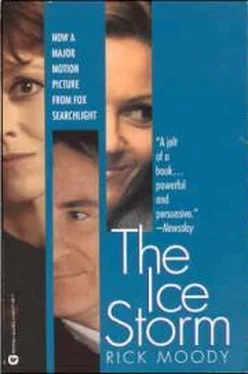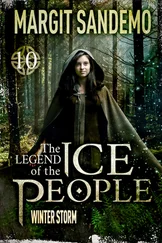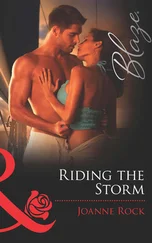Nah, it wasn’t like that. Family values. The Carpenters were family values. And Nixon making Elvis an honorary drug enforcement agent. Family kept the doors open for alcoholism and incest and battery and ignorance; it ensured the passage of racist bullshit and bigotry from one generation to the next. His parents were gene-splicers, genetic engineers, implanting him with the same grim diseases they had suffered. He was a flash fire waiting to happen. He was fucked up and friendless and his chances were about fifty-fifty.
So the train had started moving again sometime around dawn, inching along at a speed no quicker than footsteps. Messing with Paul’s unsteady pictures, with the stories he was making up, stories in which he hadn’t done all the stupid things he had done in the last twenty-four hours. The train had been reduced to some prior kind of train, a steam engine bearing them through cow country. They arrived in Stamford early in the morning and all these people, all these other losers, asked Paul if he needed a ride, if anyone was going to meet him. All these people talking to him. All this kindness. But he said, no no no, not to worry, and he had been dragging his ass around the train station ever since. He had fought some babyish response to all this, he had pasted a smile on his mouth — yeah, my parents are coming for me. Asked a cabbie if this money, these last few crumpled bills — were enough to take him to New Canaan? Yep, the money was enough, but the roads were impassable. Have to wait till they cleared them off.
Anyway, Paul knew about these long waits. His mother was always late. He wasn’t surprised to be reduced to this. He would start walking soon, except that he wouldn’t walk home, he would walk back to school. He would walk until he could hitch and then he wouldn’t stop until he was way up in the North. He wouldn’t stop until he was so far north there were no deciduous trees, until granite bubbled up underneath every lawn. Glacier country.
He moved from the old waiting room with its congregation of bad-luck types, back out onto the platform, up and down the platform, kicked some newspaper vending machines, hoping for spare change. He paid ten cents to get into the pay toilet and washed his face. Back to the waiting room. Back out onto the platform.
He knew that he wouldn’t come to a bad end, though, because he knew how comic books ended. They never ended. Comic books never ended. There was always more character development. Always another wrinkle in what had seemed to be unchanging and permanent. Every time the Thing left the F.F. he came back. His pain and rage receded and he was bantering jocosely with Stretcho and Sue and Johnny. He was back. Nobody ever died, at least not forever, and nobody ever disappeared, no quarrel was devastating, no closure was entire. The good moments, when the light outside was just right and everybody agreed — these moments came back again and again. Franklin would be resuscitated. Sue would take Reed back. And Dr. Doom, whose ashes had been scattered in sub-space, would menace them again. He’d impersonate their landlord or their accountant or something.
So, after spending an hour stripping the emblems off of expensive cars in front of the train station, Paul Hood wasn’t surprised to see his family’s red Firebird ease into the parking lot. The Firebird. His face flushed. His heart was stuck up in him somewhere where he couldn’t ignore it. He had a heart. When his mother got out of the car, he remembered that time — when he was a kid — when they had gone away for a week and left him and Wendy with a battle-ax whose only defense for her cooking was that her husband, rest in peace, had had no sense of smell. Paul saw his mom and he remembered when they had finally come home, when Daisy Chain wouldn’t shut up for half an hour barking and climbing all over the furniture. For a couple of hours everyone had been laughing.
His dad climbed out of the car, and Wendy pushed forward the bucket seats, with the dog slobbering behind her, and they were all standing out there smiling these strange half-smiles. His family. His mom was his mom and his dad was his dad and he was stuck with that, whatever became of them. Like Darien was stuck with the Long Island Sound, like the Cambodians were stuck with the Mekong, like Concord was stuck with the Merrimack. It was better than spending the rest of your life on Conrail. Home was where they had to take you in. Language was for praising home, for praising home and God and rivers. God and language and rivers and home were elastic. Everything stretched around the surface of family.
But these weren’t smiles, really. His family wasn’t smiling. Smiles were cheap jewelry. They were looking down, his family, scuffing the snow and ice in the parking lot. It wasn’t as good as all that. It wasn’t a romance. It was enough that he dropped the emblems. Just unloaded those elaborate bits of chromium right on the cracked pavement there. He threw his arms around his puffy dad. And then he threw his arms around his icy mom. Kissed Wendy. Kissed the dog.
— Well, we are glad you are okay, his father said. How long have you been here?
Paul just threw up his hands.
— Have a lot to tell you, Benjamin said. Everyone tried to laugh.
— And it’s not all good.
It was all quiet again. They buckled themselves into the car, heat on high, as if they had all been deprived of heat lifelong. Daisy Chain scrambled over Wendy’s back to get his humid dog tongue all up in Paul’s face.
Then Paul’s dad just put his head down on the steering wheel and sat that way for a while. This went on for a long time. And then he started to choke or something. Paul had never heard anything like it. He thought it might be a joke. Or a medical emergency. He didn’t know what to do. His mom’s gloved hand wavered in the air at his father’s back as though she were going to set it there. She didn’t. His father turned back to look at him, to look at Wendy, smiling, not saying anything, his cheeks shiny with some dew.
— Something I have to tell you two, he said.
And right then there was a sign in the sky. An actual sign in the sky. The conversation stopped and there was a sign in the sky and it knotted together everything in that twenty-four hours. Above the parking lot. A flaming figure four. And it wasn’t only above the parking lot. They saw it all over the country, over the Unitarian Church of Stamford, over New Canaan High School, over the Port Chester train station and up and down the New Haven line, over emergency vehicles in Greenwich and Norwalk, over the little office where Wesley Myers was trying to write the next day’s sermon, for the first Sunday in Advent. In halls devoted to public service, in private mansions and dilapidated apartments. The heavens declared: the flaming figure four.
They saw it from the Firebird. They did, and it stayed with them all that fall, that apotheosis.
Or that’s how I remember it, anyway. Me. Paul. The gab. That’s what I remember. And this story really ends right at that spot. I have to leave Benjamin there with that news, with a wish for reconciliation that he will bury in himself; I have to leave Elena, my mom, whom I have never really understood; I have to leave Wendy, uncertain, with one arm around the dog, and I have to leave myself — Paul — on the cusp of my adulthood, at the end of that annus mirabilis where comic books were indistinguishable from the truth, at the beginning of my confessions. I have to leave him and his family there because after all this time, after twenty years, it’s time I left.
PRAISE FOR RICK MOODY’S THE ICE STORM
“THE ICE STORM is a powerful indication that the art of the novel is in the best of hands with the younger generation. A remarkable work, full of wit and drama.”
Читать дальше












